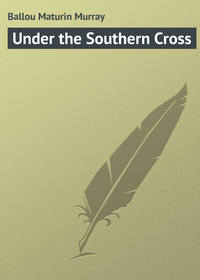 полная версия
полная версияBiography of Rev. Hosea Ballou
The reader will probably agree with us, that there is something exceedingly striking, as well as most affecting, in the domestic circumstances to which I have alluded. The character of Mr. Ballou's father, reminds us of one of those stern old Cameronians of Scotland, so well described by one of the first writers of the age. With but little sympathy for his creed, we must nevertheless respect his sincerity; nor can we wonder at all, with his education in the faith which he preached, and hampered by the illiberal spirit of the period, which seemed to mildew every generous prompting of the human heart, that he clung to it with inflexible tenacity. But we must contemplate with unqualified admiration the heroic self-denial, the martyr-like firmness, with which this servant of the Lord pursued what he believed to be the path of his duty, amidst circumstances of such extraordinary deprivation. Truly, he abandoned all to serve his Master. His severest trial must have been to witness the privations of his family. A man can endure in his own person what it costs him agony to witness inflicted on those nearer and dearer to him than life itself. The struggles of that little flock, bereft of a mother's tender care and guidance at the very time when they most required it, must have given many an anxiously painful day and night to a father's heart. Yet, we have seen how they were sustained.
This is probably by no means an isolated case of trial. It is but a type of the condition of many of the early settlers in a new country, – in short, a picture of American pioneer life. It is from such beginnings, and under such circumstances, that the most useful and energetic of our countrymen have sprung. It is not to the lap of luxury that we are to look for the source of manly character and manly virtues. The rough nurture of his early years most unquestionably fitted Mr. Ballou for the battle of life which he was destined to fight. It trained him for the long and severe journeyings of his apostolic missions, and it warmed his sympathies for the poor, while it gave him that indifference to ease and luxury which so largely conduces to true mental independence. It taught him also to rely under Providence upon himself; and these early privations, while they strengthened and indurated him, rendered the honorably acquired competence and comforts of his later years in life doubly grateful and acceptable.
Notwithstanding this stern experience of his tender years, and in spite of every hardship, and the severe labor he was obliged to perform under such unpropitious circumstances, still he grew up strong, healthy and vigorous, both in mind and body, possessing a form and face of manly beauty, with expression and intelligence reflected in every feature. In stature he grew to be six feet high, his figure very erect, with finely formed limbs, and a bright, clear blue eye. His whole appearance indicated good health even to advanced old age, his constitution being naturally excellent, and his frugal and temperate habits seconding the kindly purpose of nature. Heaven had marked him for its servant, and breathed into his soul a spirit of energy and unflinching perseverance, that no hardship could quench or diminish. Christ chose his disciples from among the lowly fishermen of Galilee; God herein took an humble but faithful follower from a cottage amidst the mountains.
Although descended from a devout and eloquent preacher of the Scriptures, the reader will at once observe that Mr. Ballou was not indebted in the least particular for the future lustre of his reputation as a powerful and original thinker, writer and teacher of the gospel, to his birth, or early condition in life, but that, on the contrary, he was literally a self-made man, owing his position strictly to individual merit alone. Enjoying none of the educational advantages resulting from wealth, or even from a simple competency, yet he steadily rose above every impending obstacle in his path, to the truly enviable position which he attained in the hearts of thousands upon thousands who were led through his teachings, both orally and through the productions of his prolific pen, to see their God and Father as he is in all harmony and beauty. Thus it is that poverty of condition and wealth of intellect go often hand in hand.
"Where, in modern history," asks Rev. A. E. Abbott, in his late eulogy upon Mr. Ballou, "can another instance be found of a man laboring under such disadvantages, in the face of such opposition, and yet performing such a work? Those who have heretofore accomplished much in that field, have had all the advantages which the most thorough culture of their times could give. Like the giant of Gath, they have taken the field encased in polished armor; he, like the stripling of Bethlehem, came to the contest with only the shepherd's sling and the smooth stones from the brook."
As no general rule can be adduced for the formation of human character, so long as the power of early association, the influence of education and example, each and severally produce in different individuals exactly opposite effects, so no general rule can be applied as to the result of certain accessory circumstances. Therefore we deduce no result from the mere fact of Mr. Ballou's father having been a professed minister upon the character of his son, having no belief that genius is hereditary, or that paternal authority can influence its natural course. Indeed, the reader is doubtless well aware that the opposition of a father to the natural bent of his child, rarely fails more strongly to develop the original taste and purpose, generally arousing in the end a spirit of resistance, that is pretty sure to strengthen by opposition.
Before the age of sixteen, by the utmost perseverance, ingenuity, and industry, the subject of this biography had learned to read and write with facility, almost entirely by his own unaided exertions, or with little assistance of any kind; for had there been a school in the neighborhood of Richmond, which was not the case, he could have found no time to attend it, being ever laboriously engaged from morning until night. He learned to form the letters of the alphabet in the following ingenious and original manner, which he related to us when a mere child, we were making the first advances in the use of the pen. After not a little thought and sober calculation as to how he should accomplish his purpose, – for pen, ink and paper were luxuries his father's means could not command, – for paper he substituted thin pieces of birch bark, neatly prepared for the purpose by his own hands, and for pen and ink he used coals taken from the fire. With these rude materials, after the labors of the day were over, seated on the floor, by the light of the fire, – for candles were too expensive to be afforded in the frugal household of his father, – he taught himself to write. A student, actuated by such resolution and determination of purpose, must soon become a proficient, in defiance of every minor obstacle; and thus he speedily improved with these humble means.
Some further idea of the limited means of his father's family, and the extraordinary disadvantages under which his early progress was made, may be gathered from the fact, that the only books the house contained, or in fact that the family had access to at all, were a Bible, an old dictionary, and a well-thumbed pamphlet of the scriptural story of the tower of Babel. A newspaper in the days of which we write, in the town of Richmond, would have been considered a most rare curiosity. Perhaps this very dearth of literary material led Mr. Ballou to be the more intimate with that volume with which alone no student can be poor, without which the largest library is incomplete. It has been remarked of the sacred volume, that, as the face of nature is bedecked with colors and adornments to render it agreeable to the senses, so its pages are filled with that luxury of poetry and language and incident which commends it to every imagination. Even the half-unbelieving Byron confessed that nothing in literature was finer than the poetry of the Old Testament. Thus the word, like the bow of promise, is gilded with the fairest hues. The solemn march of historical narration, the sublime hymns of triumph, praise and rejoicing, the records of battles and heroic deeds, the familiar narrative, the interesting parable, the pithy proverb, the terse and vigorous delineation of character, the sublime visions of inspired prophecy, are all there. Of almost every style of literary composition there is an example, captivating alike to the humblest reader and the most cultivated critic. It is the beginning and the end of learning. In the midst of the sublimest flights of human genius, amid the most burning words of modern eloquence, introduce a passage of scripture, and how poor will seem the language and the thoughts by which it is surrounded!
"Within whose sacred pages liesThe mystery of mysteries,"Need we count that house poor in literary possessions which contains a Bible?
If it be true that there are certain ennobling qualities, to produce which a soil of privation and poverty is requisite, the reader is doubtless already prepared to allow that Mr. Ballou was not deficient in the necessary experience for their possession. A lack of those advantages which are enjoyed in the "schools of human learning" did not lead him in the least to undervalue the humble opportunities for acquiring mental discipline and useful information that every-day life graciously affords to all. But the clear, free river of knowledge and unbounded information, that now pours out its wealth at the feet of the people, was then undiscovered. It has been left to these more modern and favored times for inventions in the arts to so revolutionize the means of disseminating knowledge, as to lay the wealth of wisdom at the poor man's door.
At the age of sixteen he left the paternal roof for the first time, and made a journey on foot to Guildford, Vt., a distance of about forty miles from Richmond. Here he visited an elder brother, and, after working with him upon his farm through the season, returned to his father's house again in the fall. About one year from the time of his visit to Guildford, he visited another brother who resided in Putney, Vt., where he also labored for a season upon the farm, employing all his leisure moments to the improvement of such simple means as were within his power to command, aided by the greater experience and better mental cultivation of his brother. He remained through that season only at Putney, however, and returned again in the fall of the year to Richmond.
At the age of eighteen he went to Smithfield, R. I., where many of his relations, on the paternal side, were settled. Here also he devoted himself to constant labor during the day, and to the eager perusal of any and all books to which he could obtain access, during the evenings and a large portion of the nights. He remained in Smithfield but about six months, again returning to the place of his nativity. In making these changes he was almost solely actuated by a desire for instruction and general information, and this being his great aim, we have seen how much he improved every available means to consummate it, and thus his exploring and impressible mind was not a little enriched. The time passed at home during the intermediate and subsequent periods to those referred to, was employed by him upon his father's farm, in the tilling of the soil, and in constant efforts to improve his mind. Those who were older than himself were earnestly questioned for their experience. Those who had enjoyed any educational advantages were eagerly sought after, and regarded by him as favored beings, and their conversation listened to with avidity.
The improvement and development of a mind in this condition, a healthy mind in a healthy body, is exceedingly rapid. It is then
"Wax to receive, and marble to retain."It seizes eagerly on all the food placed before it, and rapidly digests every acquisition. The condition of a mind with every appliance for improvement at hand, is not unlike that of a person with every variety and quality of food set before him for the gratification of a bodily appetite. Repletion, satiety, and indigestion, follow in one case precisely as in the other. Many of our modern students are crammed and gorged with study. The mental appetite is over-indulged; and an attempt to master too much is doubtless the besetting literary sin of the present day. The cases of mental dyspepsia are as common as those of the body. Sound scholarship consists not so much in the quantity of material consumed, as in the quantity properly prepared for intellectual nurture. A man may possess a fund of encyclopedic knowledge, and yet his mental powers may be weakened by the very process of grasping so many details. He may be good authority to appeal to, but will hardly prove a sound thinker or a good logician. "Not many, but good, books," was the golden advice of a wise man on the formation of a library. Self-made men, like Mr. Ballou, are apt to make judicious selections in culling the great field of knowledge, while those who pass through a regular, systematic, academic training, are often forced to fill their minds with a mass of matter for which they have no use, and to waste much time in questionable acquirements, simply because in so doing they comply with the requisitions of a prescribed formula.
It was customary for the young men of all classes in those days to pursue athletic exercises, such as pitching the bar, leaping, wrestling, and the like, these being regarded as the surest tests of bodily strength. Possessing a powerful and active frame, he was ever the victor in those sports; and from his marked success among his comrades in this respect, and his fair and impartial disposition, he was universally the umpire in all disputes growing out of these and like contests for superiority that arose between one and another. In the matter of his physical strength, particularly when young, he ever cherished, a laudable degree of pride, and delighted in accomplishing a large amount of work within the hours devoted to labor.
In this connection, Mr. Ballou says: – "I have the comfort, even in my old age, of remembering that I was deemed in our family circle to be a good child, and marked for giving evidence of being less averse to necessary labor than others. Though this contributed somewhat to make me proud, and to think well of myself, in other respects it was of some advantage to me to be held in esteem by my mates, who ever showed that they had a peculiar regard for me."
Mr. Ballou undoubtedly owed the vigorous health which carried him through the exertions of a life protracted beyond the allotted span, to the athletic training of his youth, in his labors and in his sports. One of the besetting sins of the present mode of education is the almost total neglect of physical training, and the forcing system applied to the mind at the expense of the body. We hear much about sanitary reform and the necessity of exercise; we write and read voluminous treatises on the best mode of preserving bodily health, and almost all of us can talk learnedly upon the subject, and yet in practice we set at naught all our elaborate theories. How rare it is to see a vigorous, ruddy-cheeked student. The ancients were wiser than ourselves in this respect, for with them mental and physical training went hand in hand. A popular form of instruction was that given orally in the open air; and thus, during the very hours of study, the frame was submitted to the healthy influence of pure air. The subject of these memoirs often referred to the pale cheek, stooping form, and defective vision which are characteristics of the American student, and he never failed to inculcate on all proper occasions the preservation of health as a high moral duty.
While of tender age, and in each successive year, he evinced an ardent and constantly increasing desire for scriptural knowledge; and the earliest dawnings of his young mind among his brethren were of a character that gave promise of the Christian grace and excellence to which he attained in after years. It is interesting and curious to trace the unconscious, and, so to speak, the providential adaptation of the early life to the future calling of riper experience. Mr. Ballou says, in relation to this subject: – "I was remarkably inquisitive, even when a mere boy, about doctrines. I was fond of reasoning on doctrinal points, studied and talked much upon the subject of free will and necessity. I well remember to have surprised my honored father with such a question as the following: 'Suppose I had the skill and power out of an inanimate substance to make an animate, and should make one, at the same time knowing that this creature of mine would suffer everlasting misery, – would my act of creating this creature be an act of goodness?' The question troubled my father, and I let it pass without an answer."
These frequent questions had the effect of causing the father much uneasiness of mind, and he used often to express great solicitude and fear for the present and future welfare of his son. Many were his endeavors to convince Hosea of the dangerous character of the sentiments that seemed to be springing up spontaneously in his heart, but the unprofitable nature of these efforts soon became apparent, from the fact that the simple, natural arguments of the son confounded the father. Boy as he was, he yet would not take the assertions of faith for argument, but insisted upon reason, and understanding at all times the "root of the matter."
To the honor of this truly pious and devout parent, it should be remembered, however, that these controversies never elicited an unchristian spirit, or the least anger towards his child. This was a natural and beautiful characteristic of his father's disposition.
CHAPTER IV.
BECOMES A PROFESSOR OF RELIGION
At the age of nineteen, there being what was termed a reformation in the town of Richmond, Mr. Ballou was induced, believing it to be his duty, to become a professor of religion, and accordingly at that time he joined the Baptist church, of which his father was pastor, in the month of January, 1789. It is very evident that he was partly induced to this circumstance by the bearing of external circumstances and the immediate associations about him, such as observing the conduct of others of his own age, who at that time made a formal and public profession of faith, and also by what he knew very well to be his father's earnest desire. It seems, therefore, that these matters, rather than any earnest mental conviction of faith, were instrumental in leading him to join the church as he did, – inasmuch as none of those objections which he had often made to his father's belief, had yet been cleared up to his mind.
But this joining of the church was plainly of immediate advantage to him, as it led him to think still more seriously and earnestly upon the subject of religion; but, owing to early prejudices, and his limited means of acquiring information, or of possessing himself of any books upon such subjects as would have been useful to him, his progress towards the light of truth was but slow. Mr. Ballou says, in relation to this conversion: – "I was much troubled in my mind because I thought I did not stand in such fear of the divine wrath as I ought to do, or as others had done before they found acceptance with God. I well remember that as I was returning home from a conference meeting, one evening, when about a quarter of a mile from home, being alone, I stopped under a large tree, and, falling on my knees, prayed as well as I could for the favor I sought." His connection with his father's church, though it continued but a short period comparatively, seems to have made no slight impression upon his mind and feelings, for he says: – "I have always felt towards this people (the Baptist denomination) as one feels towards his family, and though the religion of Christ consists in love to all men, I have a peculiar feeling for the Baptists."
In his researches and reading concerning the creed that he had now publicly professed, he found it impossible to bring his heart to conform to the doctrine of eternal reprobation, and this in itself, as he afterwards remarked, was an evidence of no inconsiderable importance, to his mind, that it could not be true; for why should his Heavenly Father have implanted in his heart an earnest desire for the salvation of all mankind, unless that desire was susceptible of gratification, as is every appetite, mental or physical, with which we are endowed by nature? Such thoughts caused him much and incessant anxiety of mind, because the very fact of his entertaining them, if the doctrine he had professed was true, endangered his eternal salvation; while, on the other hand, if this creed was not that taught by God's revealed word, then he was needlessly suffering, to a degree that greatly depressed him.
No wonder that this double incentive led him to search the Scriptures with the utmost care and attention, and to weigh and decide in his own mind the relation that one portion bears to another, and finally, with the help of Heaven, to make up his mind as to the true spirit and doctrine of the whole. The reader can easily imagine the fervent prayers he uttered, the sleepless nights he passed, and the arduous study he performed, in his search for the light of truth. After all this anxious solicitude, this solitary mental struggle, this prayerful communication with Heaven, he at length declared himself a believer in the final salvation of the whole human family.
Great was the surprise, disappointment, and chagrin of his father and friends generally. Being looked up to by the young men of his own age as a sort of leader in their secular plans and games, the influence of his example was greatly feared as operating upon the younger portion of the church; and as his joining it had been the occasion of much rejoicing at the time, so his declaration of unbelief in its faith was the cause of a proportionate degree of sorrow. His new declaration was at once pronounced to be downright heresy, and he was accordingly excommunicated from his father's church, the document with which he was honored on the occasion carefully stating that nothing was found against him, but that he believed in the doctrine that God would finally save all men.
In relation to this subject, Mr. Ballou says: – "Above all else, my theological bias of mind predominated, and engrossed most of my attention. As I had formerly been in the habit, while with the Baptists, of speaking in their meetings, and of offering up prayer at conference meetings, I now sometimes spoke my sentiments at meetings in my brother's house. The church of which I was still a member thought it a duty to call me to answer for the course I had taken, and I was called upon to meet the accusation of believing in the salvation of all men. I attended, but did not feel it my duty to deny the charge, or to renounce my belief. I was therefore excommunicated from the church, my letter of excommunication carefully stating that no fault was found in me, my belief in the salvation of all men excepted. I shall ever remember the tears which I shed on this solemn occasion."
It was about this period that Mr. Ballou, ever in search of improvement, possessed himself of some book of a liberal religious character as to the sentiments it inculcated, when his father, chancing to see him reading it, told him decidedly that he would not have Universalist books in his house. Promptly acquiescing, as he always did, in his father's directions, a few days subsequent, the parent, on returning home, found Hosea reading a book beside the wood-pile, out of doors. "What book are you reading there?" he asked. "A Universalist book," replied the son, respectfully. An expression of dissatisfaction escaped the father, as he turned away and entered the house. Watching until his son had placed the book in the wood-pile, and left the spot, the parent resolved to possess himself of it, and perhaps even destroy it. But, lo! when he opened it, he found it was the Bible.
In an article written many years subsequent, relative to his conversion to the faith of God's impartial grace, Mr. Ballou says: – "I found, when conversing upon the subject, that my Calvinistic tenets could be made either to result in universal salvation, or to compel me to acknowledge the partiality of the divine favor. This gave me no small inquietude of mind, as I was unable to derive satisfaction from sentiments which I could not defend. That which more than anything else contributed to turn my thoughts seriously towards the belief of Universalism, was the ardent desire with which I found myself exercised that sinners might be brought to repentance and salvation. I found it utterly impossible to bring my feelings to consent to the doctrine of eternal reprobation, and I was compelled either to allow that such feelings were sinful, or that my Heavenly Father, in giving them to me, had implanted an evidence in favor of the salvation of all men, the force of which I found no means to resist."









